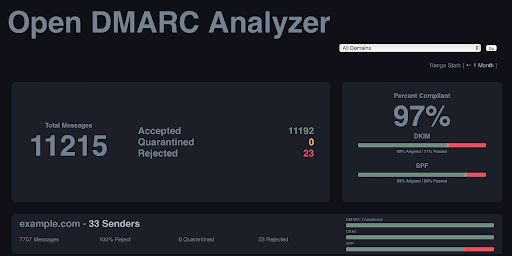The Best Open Source DMARC Analyzer You Can Use Today

With email-based threats like phishing and spoofing on the rise, email authentication has become a top priority for businesses worldwide. DMARC (Domain-based Message Authentication, Reporting, and Conformance) is now a cornerstone of email security. But having a DMARC policy in place isn't enough — you also need to monitor and analyze reports to ensure everything is working correctly. This is where a powerful DMARC analyzer becomes indispensable.
Choosing an open-source DMARC analyzer allows organizations to maintain control, reduce costs, and ensure transparency. If you're looking for a solution that offers detailed insights, easy configuration, and community support, you’ve come to the right place. In this article, we’ll explore the best open-source DMARC analyzer available today and how it can revolutionize your domain security efforts.
What is a DMARC Analyzer and Why Do You Need One
A DMARC analyzer is a specialized tool designed to parse and interpret the XML-based feedback reports generated by mail servers. These reports provide crucial insights into how your email authentication policies are being applied and whether any unauthorized sources are trying to send emails on your behalf.
Without a DMARC analyzer, reading and understanding these raw XML files can be a daunting task, especially for non-technical users. An analyzer translates this data into human-readable charts, tables, and metrics that help you make informed security decisions.
Benefits of Using an Open Source DMARC Analyzer
Open source tools are ideal for organizations that prioritize flexibility, control, and community-driven development. A free and open-source DMARC analyzer allows you to customize the tool to meet your specific needs without incurring licensing costs.
Moreover, open source projects often evolve rapidly, thanks to global developer communities. This ensures regular updates, strong documentation, and new features to keep up with the latest threats in email security.
Key Features to Look For in a DMARC Analyzer
Not all DMARC analyzers are created equal. When selecting the right one for your organization, it’s important to consider key features like real-time visualization, filtering options, support for SPF and DKIM data, and automatic parsing of daily reports.
The ideal DMARC analyzer should also offer role-based access, integration with your mail servers or SIEM tools, and clear, actionable recommendations to improve your DMARC policy performance over time.
Introducing the Best Open Source DMARC Analyzer
Among various open-source options, Try DMARC Report’s Analyzer stands out as the most robust and user-friendly tool on the market. Built for both technical teams and business leaders, this DMARC analyzer offers comprehensive functionality in a sleek, intuitive dashboard.
It supports advanced features like policy enforcement status, forensic and aggregate report parsing, subdomain monitoring, and alert systems—all while being completely open source.
How DMARC Report’s Analyzer Simplifies Your Workflow
One of the most challenging aspects of managing email security is interpreting the data. Try DMARC Report’s Analyzer transforms complex feedback into interactive charts, trend graphs, and compliance overviews that make data easy to digest.
Instead of spending hours reviewing logs, your team can quickly identify spoofing attempts, authentication failures, and unauthorized sending sources. This enables faster decision-making and continuous optimization of your DMARC policy.
Easy Installation and Deployment for All Skill Levels
You don’t need to be a DevOps engineer to deploy Try DMARC Report’s Analyzer. It comes with comprehensive documentation and a simple setup process that works on most Linux distributions and containerized environments.
Whether you're using Docker, Kubernetes, or traditional VMs, the installation steps are clearly outlined, and community support is always available. This makes it one of the most accessible open-source DMARC tools for teams of all sizes.
Integration with DNS, SPF, and DKIM Records
A comprehensive DMARC analyzer doesn’t work in isolation. It must also interpret SPF and DKIM records to deliver a complete email authentication picture. Try DMARC Report’s Analyzer, which does exactly that.
By cross-checking DMARC results with SPF and DKIM data, the analyzer gives you a full-circle view of your email ecosystem. This leads to better diagnostics, fewer false positives, and more effective enforcement policies.
Real-Time Alerting and Daily Reports
Timely information is critical when it comes to email security. Try DMARC Report’s Analyzer, which provides real-time alerts and scheduled summaries directly to your inbox, so you're always in the loop.
These alerts help you stay ahead of potential threats, allowing for immediate action when anomalies are detected. Automated reports can also be customized based on severity, domain, or time range, making your security monitoring more efficient.
Optimizing Email Deliverability and Brand Reputation
A hidden benefit of using a DMARC analyzer is improved email deliverability. When mailbox providers recognize that your domain is protected and well-managed, your legitimate emails are more likely to land in inboxes.
Additionally, a well-maintained DMARC policy backed by robust analysis tools enhances your brand’s reputation. Clients and partners will trust your communications, knowing they’re protected against spoofing and fraud.
Customization and Scalability for Growing Businesses
One size doesn’t fit all in email security. As your organization grows, so do your email domains, authentication needs, and compliance requirements. Open-source tools like Try DMARC Report’s Analyzer are built with scalability in mind.
You can easily add more domains, users, and reporting filters without reconfiguring the entire system. Its modular architecture allows for seamless integration with CI/CD pipelines and external logging services.
Privacy and Data Ownership with Open Source
Another major advantage of using an open-source DMARC analyzer is full control over your data. Since you're hosting the tool on your own infrastructure, you’re not sending sensitive information to third-party services.
This level of privacy is particularly important for businesses handling financial, healthcare, or government communications. It ensures compliance with regulations like GDPR, HIPAA, and others.
Community-Driven Development and Ongoing Support
The community around Try DMARC Report’s Analyzer is vibrant and engaged. Contributors continuously improve the tool with new features, bug fixes, and enhancements based on real-world feedback.
Whether you're a developer looking to extend functionality or an IT professional seeking guidance, the open-source community offers unmatched support. Documentation, forums, and GitHub repositories are all active and informative.
Cost Savings Without Compromising Quality
Unlike commercial software that often comes with high subscription fees, an open-source DMARC analyzer delivers professional-grade results at zero cost. You get access to powerful features and constant updates without breaking the budget.
This is particularly beneficial for startups, nonprofits, and small IT teams that need enterprise-grade security without the overhead of paid tools.
How to Get Started with Try DMARC Report’s Analyzer
Getting started is simple. Visit the project’s official repository, download the installation package, and follow the provided setup guide. Within minutes, you can start ingesting DMARC reports and viewing insights in your browser.
Don't forget to configure your domain’s DNS settings to send reports to the analyzer. Once set up, you'll immediately start seeing where and how your emails are being sent and received—giving you full control over your domain.
Elevate Your Email Security With the Right Tools
If your business is serious about email authentication, then a DMARC policy is only the first step. The next—and arguably more important—move is analyzing that data effectively.
Choosing an open-source solution like Try DMARC Report’s Analyzer ensures you're always informed, always protected, and always in control. It’s time to upgrade from static records to real-time analysis and embrace the full power of DMARC monitoring.
Note: IndiBlogHub features both user-submitted and editorial content. We do not verify third-party contributions. Read our Disclaimer and Privacy Policyfor details.







